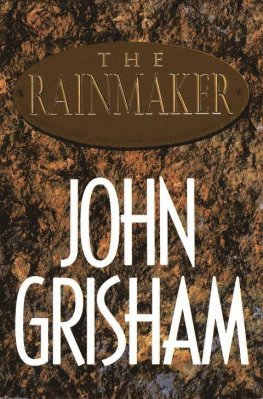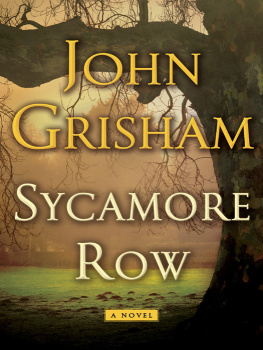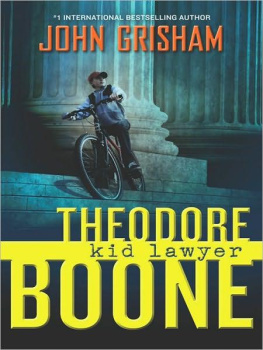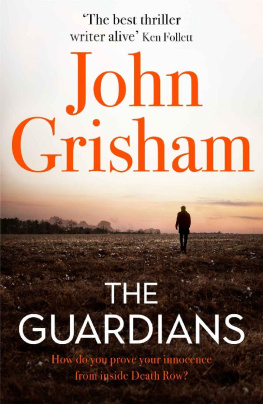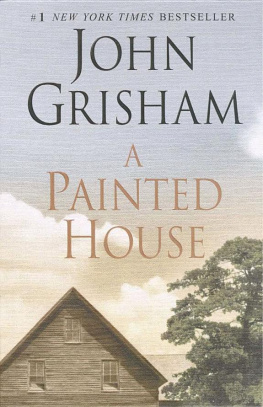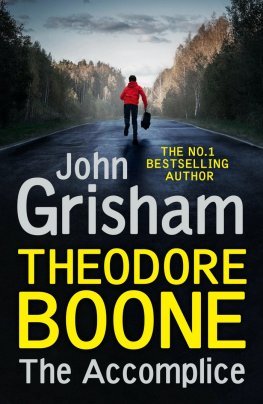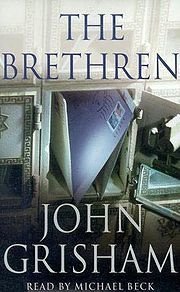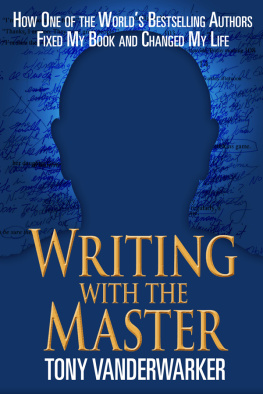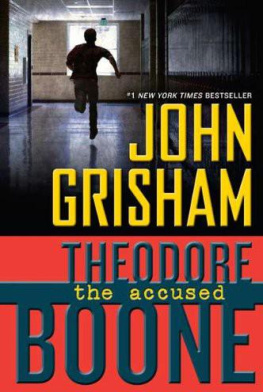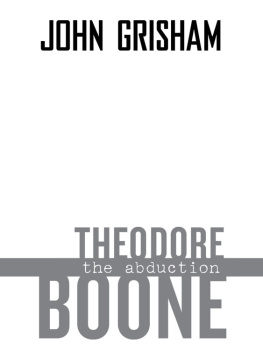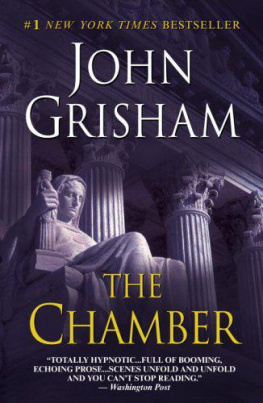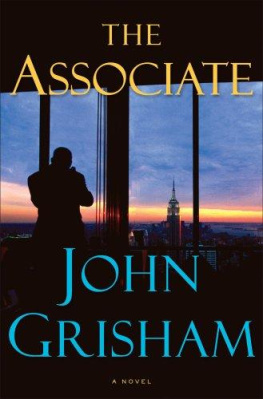John Grisham
The Rainmaker
My decision to become a lawyer was irrevocably sealed when I realized my father hated the legal profession. I was a young teenager, clumsy, embarrassed by my awkwardness, frustrated with life, horrified of puberty, about to be shipped off to a military school by my father for insubordination. He was an ex-Marine who believed boys should live by the crack of the whip. Id developed a quick tongue and an aversion to discipline, and his solution was simply to send me away. It was years before I forgave him.
He was also an industrial engineer who worked seventy hours a week for a company that made, among many other items, ladders. Because by their very nature ladders are dangerous devices, his company became a frequent target of lawsuits. And because he handled design, my father was the favorite choice to speak for the company in depositions and trials. I cant say that I blame him for hating lawyers, but I grew to admire them because they made his life so miserable. Hed spend eight hours haggling with them, then hit the martinis as soon as he walked in the door. No hellos. No hugs. No dinner. Just an hour or so of continuous bitching while he slugged down four martinis then passed out in his battered recliner. One trial lasted three weeks, and when it ended with a large verdict against the company my mother called a doctor and they hid him in a hospital for a month.
The company later went broke, and of course all blame was directed at the lawyers. Not once did I hear any talk that maybe a trace of mismanagement could in any way have contributed to the bankruptcy.
Liquor became his life, and he became depressed. He went years without a steady job, which really ticked me off because I was forced to wait tables and deliver pizza so I could claw my way through college. I think I spoke to him twice during the four years of my undergraduate studies. The day after I learned I had been accepted to law school, I proudly returned home with this great news. Mother told me later he stayed in bed for a week.
Two weeks after my triumphant visit, he was changing a lightbulb in the utility room when (I swear this is true) a ladder collapsed and he fell on his head. He lasted a year in a coma in a nursing home before someone mercifully pulled the plug.
Several days after the funeral, I suggested the possibility of a lawsuit, but Mother was just not up to it. Also, Ive always suspected he was partially inebriated when he fell. And he was earning nothing, so under our tort system his life had little economic value.
My mother received a grand total of fifty thousand dollars in life insurance, and remarried badly. Hes a simple sort, my stepfather, a retired postal clerk from Toledo, and they spend most of their time square dancing and traveling in a Winnebago. I keep my distance. Mother didnt offer me a dime of the money, said it was all she had to face the future with, and since Id proven rather adept at living on nothing, she felt I didnt need any of it. I had a bright future earning money; she did not, she reasoned. Im certain Hank, the new husband, was filling her ear full of financial advice. Our paths will cross again one day, mine and Hanks.
I will finish law school in May, a month from now, then Ill sit for the bar exam in July. I will not graduate with honors, though Im somewhere in the top half of my class. The only smart thing Ive done in three years of law school was to schedule the required and difficult courses early, so I could goof off in this, my last semester. My classes this spring are a joke Sports Law, Art Law, Selected Readings from the Napoleonic Code and, my favorite, Legal Problems of the Elderly.
It is this last selection that has me sitting here in a rickety chair behind a flimsy folding table in a hot, damp metal building filled with an odd assortment of seniors, as they like to be called. A hand-painted sign above the only visible door majestically labels the place as the Cypress Gardens Senior Citizens Building, but other than its name the place has not the slightest hint of flowers or greenery. The walls are drab and bare except for an ancient, fading photograph of Ronald Reagan in one corner between two sad little flags one, the Stars and Stripes, the other, the state flag of Tennessee. The building is small, somber and cheerless, obviously built at the last minute with a few spare dollars of unexpected federal money. I doodle on a legal pad, afraid to look at the crowd inching forward in their folding chairs.
There must be fifty of them out there, an equal mixture of blacks and whites, average age of at least seventy-five, some blind, a dozen or so in wheelchairs, many wearing hearing aids. We were told they meet here each day at noon for a hot meal, a few songs, an occasional visit by a desperate political candidate. After a couple of hours of socializing, they will leave for home and count the hours until they can return here. Our professor said this was the highlight of their day.
We made the painful mistake of arriving in time for lunch. They sat the four of us in one corner along with our leader, Professor Smoot, and examined us closely as we picked at neoprene chicken and icy peas. My Jell-O was yellow, and this was noticed by a bearded old goat with the name Bosco scrawled on his Hello-My-Name-Is tag stuck above his dirty shirt pocket. Bosco mumbled something about yellow Jell-O, and I quickly offered it to him, along with my chicken, but Miss Birdie Birdsong corralled him and pushed him roughly back into his seat. Miss Birdsong is about eighty but very spry for her age, and she acts as mother, dictator and bouncer of this organization. She works the crowd like a veteran ward boss, hugging and patting, schmoozing with other little blue-haired ladies, laughing in a shrill voice and all the while keeping a wary eye on Bosco, who undoubtedly is the bad boy of the bunch. She lectured him for admiring my Jell-O, but seconds later placed a full bowl of the yellow putty before his glowing eyes. He ate it with his stubby fingers.
An hour passed. Lunch proceeded as if these starving souls were feasting on seven courses with no hope of another meal. Their wobbly forks and spoons moved back and forth, up and down, in and out, as if laden with precious metals. Time was of absolutely no consequence. They yelled at each other when words stirred them. They dropped food on the floor until I couldnt bear to watch anymore. I even ate my Jell-O. Bosco, still covetous, watched my every move. Miss Birdie fluttered around the room, chirping about this and that.
Professor Smoot, an oafish egghead complete with crooked bow tie, bushy hair and red suspenders, sat with the stuffed satisfaction of a man whod just finished a fine meal, and lovingly admired the scene before us. Hes a kindly soul, in his early fifties, but with mannerisms much like Bosco and his friends, and for twenty years hes taught the kindly courses no one else wants to teach and few students want to take. Childrens Rights, Law of the Disabled, Seminar on Domestic Violence, Problems of the Mentally Ill and, of course, Geezer Law, as this one is called outside his presence. He once scheduled a course to be called Rights of the Unborn Fetus, but it attracted a storm of controversy so Professor Smoot took a quick sabbatical.
He explained to us on the first day of class that the purpose of the course was to expose us to real people with real legal problems. Its his opinion that all students enter law school with a certain amount of idealism and desire to serve the public, but after three years of brutal competition we care for nothing but the right job with the right firm where we can make partner in seven years and earn big bucks. Hes right about this.
The class is not a required one, and we started with eleven students. After a month of Smoots boring lectures and constant exhortations to forsake money and work for free, wed been whittled down to four. Its a worthless course, counts for only two hours, requires almost no work, and this is what attracted me to it. But, if there were more than a month left, I seriously doubt I could tough it out. At this point, I hate law school. And I have grave concerns about the practice of law.

